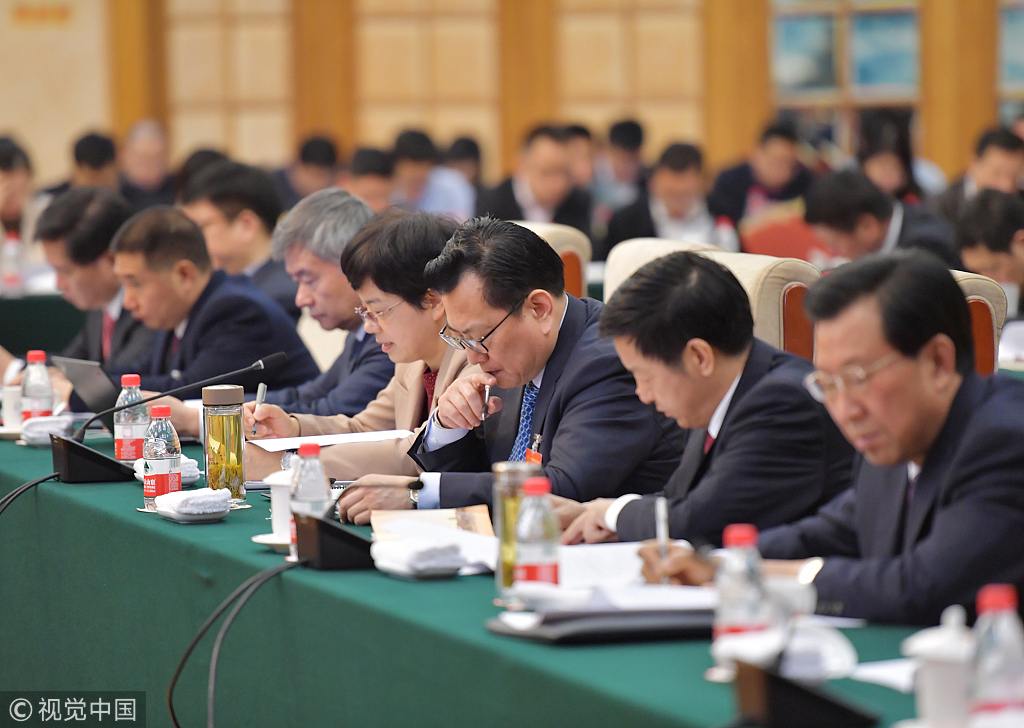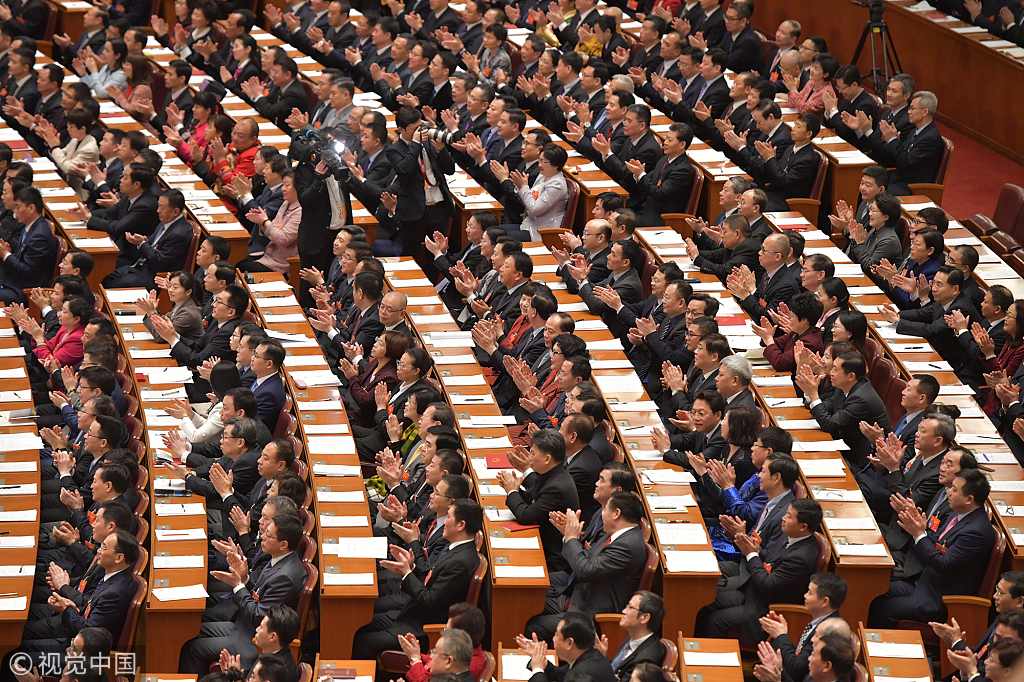
Opinion
09:58, 15-Mar-2019
Providing legal protection for China's high-level opening-up
Updated
16:43, 21-Apr-2019
Pan Deng

Editor's Note: Pan Deng is a member of the Academic Committee at the Charhar Institute and executive director of the Latin America and Caribbean Region Law Center of China University of Political Science and Law. The article reflects the author's opinion, and not necessarily the views of CGTN.
After nearly four years of discussion and revision, the Foreign Investment Law, a legal basis for the utilization of foreign capital in China in the new era, was finally passed at the second session of the 13th National People's Congress on the March 15. The law actively promotes foreign investment, protects the legitimate rights and interests of foreign investors, creates a law-based, international and friendly business environment, and provides a legal bulwark for the new round of high-level opening-up.
The Sino-foreign Joint Venture Law was one of the first laws passed at the beginning of China's reform and opening-up. Passed in 1978, it was one of the three pieces of legislation that formed the legal basis of foreign investment in China. The other two were the Law on Foreign Capital Enterprises passed in 1986 and the Law on Sino-foreign Contractual Joint Ventures promulgated in 1988.
These three laws were quickly rolled out and implemented in a short period of time, highlighting the historical mission of the legal guarantee to open the way and provide the escort for reform and opening-up. At the same time, the structure of the laws was prioritized over the details of the laws, which have set the stage for reform and opening-up.

The Zhejiang delegation held a plenary meeting in Beijing to review the draft Foreign Investment Law, March 10, 2019. /VCG Photo
The Zhejiang delegation held a plenary meeting in Beijing to review the draft Foreign Investment Law, March 10, 2019. /VCG Photo
Over the past 40 years of reform and opening-up, profound changes have taken place in both the domestic and international landscape. By the end of 2018, China had set up about 960,000 foreign-invested enterprises with an accumulated total of more than 2.1 trillion U.S. dollars of foreign capital utilized.
China's actual use of foreign capital had ranked the first among that of all developing countries for 27 consecutive years and currently, it ranks the second in the world. Foreign investment has become an important driver of China's economic and social development. In the age of further reform and opening up, the “three foreign capital laws” formulated in the early days can no longer meet the needs of developing a new economic system with an open market.
Moreover, the China (Shanghai) Pilot Free Trade Zone, established in 2013, together with another 11 FTZs, has been actively exploring new approaches to managing foreign investment. For example, they have adopted a “pre-establishment national treatment (PENT) with a negative list” approach to foreign investment, unified domestic and foreign capital laws and regulations, reformed the foreign investment approval system, and eased market access.
These measures have brought tangible benefits to foreign investors and have subsequently been replicated nationwide. In the past five years, China's utilization of foreign capital has increased against the backdrop of a decline in foreign direct investment flows worldwide. To enshrine such best practices in the law is a great boost to the confidence of foreign investors. It is also reflected a change of method in China's effort to attract foreign investment from offering fiscal incentives to creating a fair competition environment under the rule of law.
In addition, the new law has also met many demands raised previously by foreign businessmen. For example, the new law stipulates that foreign-invested enterprises shall participate in government procurement activities on a level playing field, and government procurement shall treat the products of foreign-invested enterprises produced in China equally.
This has dispelled the concerns of foreign enterprises on the exclusion of their products from government procurement. According to the legislation, when formulating laws, regulations, and rules related to foreign investment, lawmakers should listen to the opinions and suggestions of foreign-invested enterprises, guaranteeing on a legal level that foreign investors can interact effectively with lawmakers and policymakers.

The second plenary session of the second session of the 13th National People's Congress (NPC) was held at the Great Hall of the People in Beijing, where Li Zhanshu, chairman of the Standing Committee of the National People's Congress (NPCSC), delivered a report on the work of the NPCSC, and Wang Chen, vice chairman of the NPCSC, delivered a speech about the explanation of the draft Foreign Investment Law, March 8, 2019. /VCG Photo
The second plenary session of the second session of the 13th National People's Congress (NPC) was held at the Great Hall of the People in Beijing, where Li Zhanshu, chairman of the Standing Committee of the National People's Congress (NPCSC), delivered a report on the work of the NPCSC, and Wang Chen, vice chairman of the NPCSC, delivered a speech about the explanation of the draft Foreign Investment Law, March 8, 2019. /VCG Photo
In response to the concerns about the high cost and long wait time of lawsuits, the new law stipulates that the state shall establish a complaint mechanism to resolve the problems of foreign-invested enterprises in a timely manner. Foreign investors and companies may establish and voluntarily join chambers of commerce and trade associations in accordance with the law in order to safeguard their legitimate rights and interests.
Some misunderstandings of the international community on foreign investment in China in recent years can also be cleared by this legislation. For example, it stipulates that in principle the state shall not expropriate foreign investment, and if it does need to expropriate foreign investment on the ground of protecting the public interest, it shall do so in accordance with relevant legal procedures and offer fair and reasonable compensation.
Foreign investors can freely transfer their capital, profits and earnings from China to other countries in RMB or foreign currencies according to the law. In response to the complaints of so-called “industrial policies undermining market fairness” made by some countries, the law clearly stipulates that all policy incentives of the state are equally applicable to domestic and foreign enterprises. Such a principle is also reflected in other aspects such as standard setting, government procurement, financing, land use, bidding and oversight. The legislation also renders the accusation of “forced technology transfer” groundless.
(If you want to contribute and have specific expertise, please contact us at opinions@cgtn.com.)

SITEMAP
Copyright © 2018 CGTN. Beijing ICP prepared NO.16065310-3
Copyright © 2018 CGTN. Beijing ICP prepared NO.16065310-3